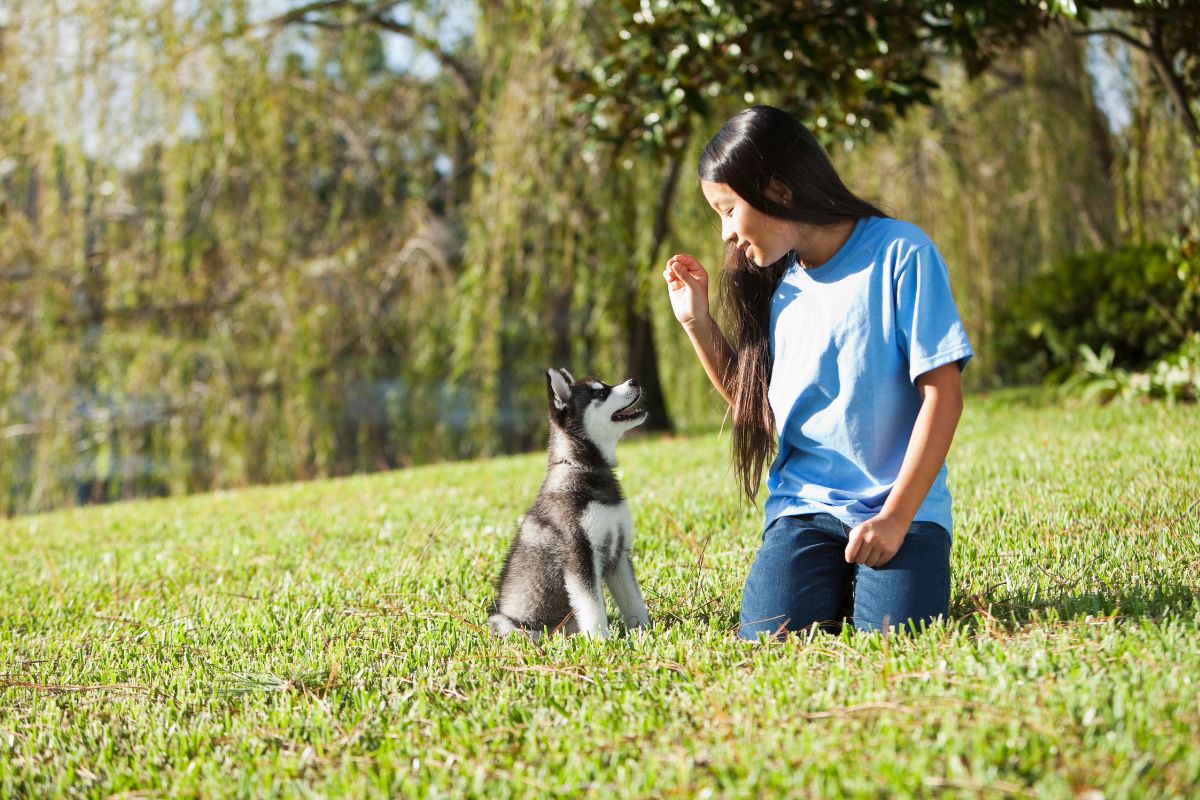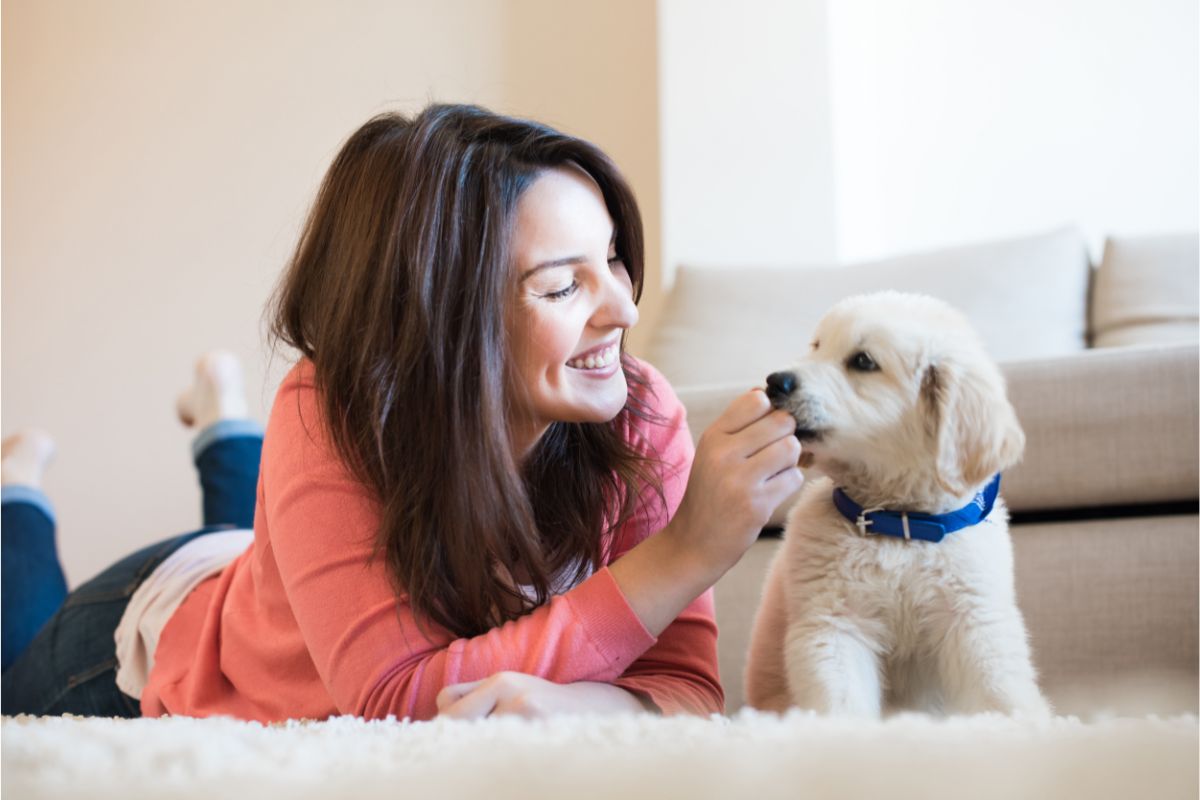So, you have a new puppy. Let the fun begin!
Having a puppy is a joy, but it’s not without its difficulties. One of the biggest problems new pet owners face is sleepless nights.

It can be just like having a baby. Your puppy may cry throughout the night, whine, bark, or even howl to be with you.
This makes the notion of having your puppy sleep with you in your bed sound very appealing. But is it a good idea?
Puppies are very busy initially, and will need your guidance to help them understand when to go to the potty, when to calm down, when to rest, and when to play. The important thing is to give them a routine.
Dogs need structure in their lives, in order to feel safe and happy in their environment.
For puppies, coming from a litter where they have mates to surround them, it can be hard for them to rest and fall asleep at night without being scared or fearful by themselves.
It is vital that you begin as you mean to go on, and ensure that going to bed is a positive thing.
While it is easier to just let them sleep with you, it’s not always a good idea and can lead to behavioral problems.
Why You Shouldn’t Let Your Puppy Sleep With You In Your Bed
We always recommend that you do not let your puppy sleep with you in your bed, especially initially in the first few months you have them.
When your dog is older, potty trained, and has settled in, you can do what you like!
However, when puppies are small, sleeping in bed with you could be dangerous, not to mention the risk of potty incidents. Here are some of the reasons we don’t suggest that you sleep with your puppy in your bed.
Increased Risk Of Injury
The first reason is that you could cause an injury. You could roll over onto your puppy, or if they are very small, they could fall off the bed and hurt themselves. Puppies are also very inquisitive, and can get into many different situations.
Your puppy could look around your room at night, chewing on wires, stealing socks, or eating something that they shouldn’t, and this can become lodged in their digestive tract.
Keeping them in a safe place during nighttime means that they can’t do those things, and you don’t have to worry about getting out of bed to see what they’re up to at all hours of the night.
More Potty Incidents
Another big factor is potty incidents and potty training. Puppies have very small bladders, and will not be able to hold in their pee or poop for long.
If you don’t want your nice bedsheets to be ruined, then we would suggest avoiding puppies on the bed.
Puppies also need a routine when it comes to going to the potty. Having a designated space that they can go to the potty avoids confusion, and encourages them to only go in that place.
In the first few weeks, you will have to get up every few hours to let them outside to go to the potty, so ensuring that you set an alarm, and keep them in a suitable area at night can ensure there are no accidents, and your puppy understands where they need to go to the potty.
You Have To Set Boundaries
Puppies can be very demanding, and they can get attached to you easily. You have to set boundaries so that they can learn the rules of your home, and not get too attached to you.
By allowing your puppy to sleep with you, they can become dependent on you, and do not have the confidence they need to be left alone by themselves.
This opens up the door to a whole range of behavioral problems such as separation anxiety (see also “Littermate Syndrome In Dogs“).
When there are no boundaries between you and your dog, and they are able to follow you everywhere, sleep with you, demand attention from you, and more, they can become so dependent on you that you will have no personal space.
They can also become stressed, anxious, nervous and destructive when you leave home or leave the room.
Some dogs may even become possessive over their owners, not allowing anyone else to come near them or to interact with them. This is not a behavior you will want to encourage.
You have to establish boundaries between you and your dog. You can do this by implementing a routine, especially at nighttime, as this can make your dog feel more confident alone.
How To Get Your Puppy To Sleep Through The Night

Here at PawPrintPets, we have so much experience in training puppies and dogs of all ages.
The most important thing that we have learned is that all dogs need a routine, and they need structure, especially those who have behavioral problems and anxiety.
Routine can help your pup feel calm and relaxed, which is essential if you want them to sleep through the night.
It is important to note that puppies will not always sleep through the night, especially when they are young.
On average, it can take around 2-3 weeks to get your puppy to sleep through the night, as most will not before around 16 weeks of age.
As mentioned above, you will have to get up and get them outside to use the potty multiple times during the night if you want to potty train them and avoid accidents.
When puppies have had accidents in their bed or crate, they will more than likely whine and cry, and wake you up, so they definitely won’t be sleeping through the night if that’s the case!
The BEST advice we can give you is to crate train your dog. Many owners are opposed to this at first, as they believe crating is cruel, but it is really not.
Dogs love cozy spaces that they can call their own, as it makes them feel safe and replicates the environment of a den.
A crate is also your dog’s space. It is a place for them to go to calm down, rest, feel at peace, and sleep.
It is also a contained area to keep them when you have people over, or if they get overstimulated, and it keeps them safe while you are out of the house.
They can’t chew something that could pose a risk, and it gets them used to crates for the purpose of going to the vets or a kennel.
Crate training can also give your puppy the confidence it needs to be by themselves.
Dogs can easily develop separation anxiety when left alone, which can lead to destructive behaviors, whining, barking and howling. You can prevent this by crating your puppy from day one.
Crate training is also a fantastic way to bring some structure and boundaries into your dog’s life.
To get your puppy to sleep through the night, you have to crate train from the moment you bring them home. The first step is to establish a positive relationship with the crate.
Try throwing some treats or food in there to make it feel like a ‘good’ space.
When your puppy enters the crate, offer praise, and some treats, and close the door.
Sit next to the crate for a few minutes, leave the room for a few seconds, and return. When the puppy is quiet, release them from the crate, and praise them.
You will have to repeat this many times, only letting them out of the crate when there is silence.
Always reward when they go into the crate, and start building up longer periods where the puppy is in the crate and you are not in the room.
Before long, your puppy will start to understand that it is a nice place to keep them safe when you are not there.
You will also need to make the crate comfortable. Add blankets or bedding, and it’s a good idea to have a crate cover to make it cozier.
You can also roll the flaps on the side of the crate cover down to make it dimly lit and protected. This can help them get off to sleep.
In addition, you will have to establish a nighttime routine.
This could include playing with your puppy before bedtime to wear them out, letting them outside for the potty, and not feeding them too late so that they will need to go outside again.
Once your puppy is calm, dim the lights or turn them off, and perhaps play some classical music on the radio quietly to help them feel calm and give them some company during the night.
Lastly, be prepared for interruptions. Your puppy is not going to sleep soundly during the first few nights, or even the first week or two.
While it is vital that you take them to the toilet during the night at first, it is so important that you do not give in to crying and whining, or they are just going to do it more.
Be consistent. After a few weeks, your puppy will begin to love their crate, and will sleep easily through the night.
Can You Ever Let Your Dog Sleep With You?
Of course you can let your dog sleep with you in the bed, if that is something that you want!
However, this should only be done after you have established a routine and boundaries between you and your dog.
Most dog behaviorists will recommend that you only do this after around 1-2 years of crate training, or until you believe that your dog is 100% crate trained and comfortable by themselves. Sleeping on the bed will then be a treat for them!
Final Thoughts
To summarize, sleeping on the bed is not recommended for puppies, dogs with separation anxiety issues, or dogs that are not potty trained.
In reality, having your dog sleep with you on your bed is your choice, we just don’t recommend that you do this with your puppy, or before you feel that your dog has structure in its life, and understands its overall role and expectations in the home.
- How To Teach Your Puppy Their Name Easily! - July 18, 2023
- Is Your Puppy Counter Surfing? Find Out How To Stop It! - July 18, 2023
- How To Train Your Puppy For Car Rides: Everything You Need To Know - July 18, 2023










